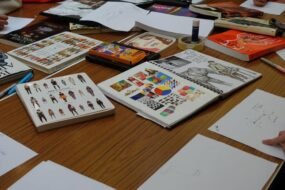
AI is already reshaping music culture, and creating “potential” new music genres as artists adapt the technology, according to a new research paper.
The paper, written by researchers at Stability AI and titled Music and Artificial Intelligence: Artistic Trends, analyzed 337 AI-related “music artworks” to answer the question “how are artists using artificial intelligence to make music?”
The short answer? “AI is mostly used as a co-composition and sound design tool, but is also heavily used for lyrics generation.”
Importantly, the research paper left out “casual creators,” such as those who might use tools that create songs from scratch like Suno and Udio, and focused on professional artists.
Among them, artists primarily use AI tools to augment their creative processes, allowing them to “retain artistic agency,” the paper said.
However, some artists are intentionally exploring the loss of creative agency brought on by AI, allowing certain aspects of their creative process to be guided by AI or other users of AI.
“Artists like Holly Herndon, Grimes, and Sevdaliza have released AI models of their voices, allowing others to create music using their vocal likenesses,” the research paper noted.
“This development introduces a new degree of interaction between artists and their audiences, enabling collaborations that transcend traditional creative boundaries.”
Notably, the researchers found that the ongoing debate about copyright in AI-generated music is one of the major reasons why some artists are creating datasets from their own music for AI to play with.
“The evolving legal landscape around training datasets has driven artists to become more deliberate in sourcing their own training data. As such, artists are curating datasets for custom training to craft their unique sound, much like sound designers program synthesizers.”
The researchers also focused on innovations made possible – or at least much easier – by AI, such as the creation of “uncanny” new sounds, or the ability of AI to translate lyrics into multiple languages.
They noted K-pop group MIDNATT’s 2023 single Masquerade, which has versions in English, Korean, Japanese, Chinese, Spanish, and Vietnamese, and Lauv’s Love U Like That in English and Korean.
Another innovation is the ability of generative AI to transform a song from one genre to another.
“Before, musicians had to dedicate years to learn a specific genre. Now, AI can blend and produce music in multiple (and potentially new) genres,” the researchers found.
“Before, musicians had to dedicate years to learn a specific genre. Now, AI can blend and produce music in multiple (and potentially new) genres.”
Pons et al, ‘Music and Artificial Intelligence: Artistic Trends’
The paper also focused on the “cultural pushback” against AI-generated music, and drew parallels between the AI revolution and earlier technological changes that were resisted by many when they altered music creation.
“The use of samples was once denounced as artistic ‘theft’ rather than genuine creativity,” the research paper states.
“Likewise, auto-tune users faced criticism for altering the natural quality of the voice, often viewed as compromising vocal authenticity…
“These cases underscore the evolving nature of artistic evaluation, where initial skepticism can transform into historical validation and cultural significance,” the researchers wrote.
“Parallels with past narratives showcase that current trends and cultural pushback are not new.”
“As AI continues to develop, its influence on music is becoming noticeable but the full extent of its impact on popular music and culture remains uncertain.”
Pons et al, ‘Music and Artificial Intelligence: Artistic Trends’
The paper noted that the introduction of the iron frame in pianos “enabled composers like Beethoven to push the boundaries of musical expression. It allowed increasing string tension, expanding the potential of the piano both in terms of sound and dynamics.”
And the introduction of amplifiers “facilitated the rise of genres like rock, blues, and jazz,” the paper noted, while “drum machines, modern samplers, and the auto-tune were key technological innovations that influenced the development of new music genres.”
The researchers highlighted the cultural impact that AI music has already had, from the millions of streams that AI-generated music has received on streaming platforms, to the popularity of the “fake Drake” track Heart on My Sleeve a few years back.
It noted the technology has allowed the release of music from established artists that would otherwise not have been possible, such as The Beatles’ Now and Then, which used AI techniques to restore John Lennon’s voice recorded on a boombox in 1978, and AI vocals imitating Randy Travis, allowing the country star to release a new song more than a decade after losing his voice due to a stroke.
Finally, the paper notes that at this early stage of AI development, the future trajectory of AI in music remains unclear.
“As AI continues to develop, its influence on music is becoming noticeable but the full extent of its impact on popular music and culture remains uncertain.”Music Business Worldwide








